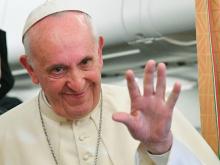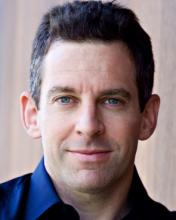transcendence

IN THE SPAN OF OUR HOUR-LONG conversation, Mimi Mutesa, an emerging Ugandan-American photographer-videographer and an undergraduate student at Calvin College, a Christian Reformed school in Michigan, easily gives her thoughts on everything from the complexities of blackness to the policing of women’s bodies. However, when I ask her how her faith influences her work, there is a brief pause on the other end of the line.
“I don’t think it’s ever crossed my mind until this moment,” she says. When pressed, she explains that she’s “trying to tackle enough issues” in her art as it is, and evangelical culture has “far too many other problems” for her to address. Mutesa assures me that she still identifies as a person of faith but maintains that her relationship with God is “separate” from her relationship to art and social justice.
Perhaps this separation is a necessary one. It’s hard to imagine the average evangelical church embracing Mutesa’s colorful portraits of nude black joy. Her sentiments echo an unspoken opinion held by many young Christians, that if you want to be radical like Jesus was, you must do so on the margins of Christianity. More traditional folks may see this rush to the margins as a slick avoidance of the Christian call to profess one’s faith, or a symptom of postmodern discomfort with absolute truth. But what is more likely is that millennials of faith, especially millennials of color, want to engage with values traditionally cherished by the church but see modern-day Christianity as a direct hindrance to that sort of exploration, since significant portions of the church have been antagonists in struggles for social equality.
Reticence to conflate personal faith with artistic vision is deeply connected to a complex historical dialectic between the arts and the church: Mutesa’s midconversational pause is supported by precedent.

Pope Francis leaves on Monday, Oct. 31 for an overnight trip to Sweden, a historically Protestant country that today is one of the most secular in the world.
The visit is to mark the start of observances of next year’s 500th anniversary of the Reformation, which traditionally dates from Oct. 31, 1517, when Martin Luther nailed his 95 Theses to the door of a German cathedral.

Uber-atheist Sam Harris is getting all spiritual.
In his new book, “Waking Up: A Guide to Spirituality Without Religion,” the usually outspoken critic of religion describes how spirituality can and must be divorced from religion if the human mind is to reach its full potential.
“Our world is dangerously riven by religious doctrines that all educated people should condemn,” he writes in the book, but adds: “There is more to understanding the human condition than science and secular culture generally admit.”
The prescription, Harris holds, is Buddhist-based mindfulness meditation. A Stanford-trained neuroscientist, Harris is a long-time practitioner of Buddhist meditation. He said everyone can, through meditation, achieve a “shift in perspective” by moving beyond a sense of self to reach an enlightening sense of connectedness — a spirituality.
Musician Nicole C. Mullen and theologian Ellen F. Davis articulate the goodness of God in their own unique ways.
LAST FALL, I (Anne Marie) decided to take a break from the church I had been attending to check out a nearby Episcopal service with one of my housemates, Joshua. I had no idea at the time that this might turn into a permanent switch. My Baptist, Anabaptist, and evangelical roots don’t quite explain what drew me to St. Stephen’s Church that Sunday, but I remember the thought that kept going through my head: I need to take Communion.
For a number of reasons, I had been feeling apathetic toward Christian faith. I needed something official and visceral to cleanse me of the growing indifference I felt. The thought entered my mind: I need some bread and wine, because if my own prayers can’t kindle the spirit of Jesus within me, then I’ll get him in there by force. I hoped that partaking in the real-deal-flesh-and-blood would allow me to return to my own church in peace.
I can’t say that the Episcopal service that day cured me of all my doubts and frustrations about Christianity, but I did find meaning in the liturgy, rituals, and traditions that continued to sustain me in my first year in a new city. As Joshua and I continued to attend St. Stephen’s, we each reflected on what we, as young adults, are looking for in church and Christian community.
Church advertisements often focus on how to keep young people “engaged,” and there are countless new books about why young people are leaving the church. Statistics show decreased church attendance among those in our generation, and while this may be cause for concern, I’m not too worried about it. I’m glad that churches and denominations are interested in engaging young people, but so often this well-meaning desire is rooted in fear and anxiety about the future of the church. Is Christianity becoming obsolete? Will the church die away?
News flash: Christianity isn’t going anywhere. But churches and denominations may have to adapt—and not necessarily the way they’re doing so now—if they are to survive.
As 20-somethings who’ve left the cocoons of family and college for our first forays into the “real world,” we have two basic conclusions about what we are looking for in church communities.

EVERY FEW YEARS I rediscover a song by R.E.M., “You are the Everything.” It juxtaposes despair over the state of things (“Sometimes I feel like I can't even sing / I'm very scared for this world”) with deceptively simple memories: A starry sky. The sensations of a random moment long ago. The feel of our own bodies. The sight of someone beloved (“I look at her and I see the beauty / of the light of music”).
This song gives me cathartic comfort when the news seems too much to bear. It doesn't erase famine, wars, rumors of wars, a friend's bad pathology report, or my concern over the body politic. But my position shifts; I anchor myself to the beauty of creation, to the miracle of being an embodied soul, to the fragile graces of human relationship, and to the One who brought it all into being. Thin guy wires of memory and spirit steady me against sweeping currents of events, so that I can focus on them, yet not drown.
In his seminal 1974 book Models of the Church, theologian Avery Dulles offered five paradigms, or "models," each of which called attention to certain aspects of the worldwide Christian church. The church, Dulles wrote, is in essence a mystery -- a reality of which we cannot speak directly. Thus we must draw on analogies to understand the church in deeper ways.
Dulles developed five models, drawing on a range of theological schools and traditions, both Protestant and Catholic, to illuminate different aspects of the church. His models included church as institution, mystical communion, sacrament, herald, and servant. Dulles was careful to point out that no single model, by itself, adequately paints a complete picture of the church; each contains important insights about the nature of the church.
Whenever Karen Ward, Abbess for Church of the Apostles (COTA), makes a suggestion about what's happening on the faith fringes, she tends to be spot on.